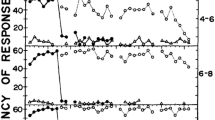Abstract
Recent pessimistic assessments of behaviorism’s contributions and future role are examined and found wanting. Research in social psychology and large-scale applications, as well as recent books on social processes, are shown to make considerable use of operant principles. Although these principles are largely hidden by conventional phrasing and often are not specifically acknowledged, their general acceptance makes them appear to be almost a part of psychology’s conventional wisdom. Implications for behaviorism, in terms of core principles and peripheral implications, as well as a “school,” are briefly discussed.
Similar content being viewed by others
References
ARONSON, E. (1992). The social animal (6th ed.). New York: W. H. Freeman.
BAILEY, J. S. (1991). Marketing behavior analysis requires different talk. Journal of Applied Behavior Analysis, 24, 445–448.
COLEMAN, S. R., & MEHLMAN, S. E. (1992). An empirical update (1969-1989) of D. L. Krantz’s thesis that the experimental analysis of behavior is isolated. The Behavior Analyst, 15, 43–49.
CZUBAROFF, J. (1993). Convergences with behavior analysis: Recommendations from the rhetoric of inquiry. The Behavior Analyst, 16, 1–8.
ERASMUS, C. J. (1961). Man takes control: Cultural development and American aid. Indianapolis: Bobbs-Merrill.
GARDNER, H. (1985). The mind’s new science: A history of the cognitive revolution. New York: Basic Books.
GLENN, S. G. (1993). Windows on the 21st century. The Behavior Analyst, 16, 133–151.
GUERIN, B. (1992). Behavior analysis and social psychology: A review of Lana’s Assumptions of social psychology. Journal of the Experimental Analysis of Behavior, 58, 587–604.
HAYES, S. C. (Ed.). (1989). Rule-governed behavior: Cognition, contingencies, and instructional control. New York: Plenum.
JACKSON, J. M., & HARKINS S. G. (1985). Equity in effort: An explanation of the social loafing effect. Journal of Personality and Social Psychology, 49, 1199–1206.
JACKSON, J. M., & WILLIAMS, K. D. (1985). Social loafing on difficult tasks: Working collectively can improve performance. Journal of Personality and Social Psychology, 49, 937–942.
KARAU, S. J., & WILLIAMS, K. D. (1993). Social loafing: A meta-analytic review and theoretical integration. Journal of Personality and Social Psychology 65, 681–706.
KERNIS, M. H., ZUCKERMAN, M., COHEN, A., & SPADAFORA, S. (1982). Persistence following failure: The interactive role of self-awareness and the attributional basis for negative expectancies. Journal of Personality and Social Psychology, 43, 1184–1191.
KERR, N. L. (1983). Motivation losses in small groups: A social dilemma analysis. Journal of Personality and Social Psychology, 45, 819–828.
LAMAL, P. A. (1989). The impact of behaviorism on our culture: Some evidence and conjectures. The Psychological Record, 39, 529–535.
LATANE, B. (1981). The psychology of social impact. American Psychologist, 36, 343–356.
LATTAL, J. D. (Ed.). (1992). Reflections on B. F. Skinner and Psychology. American Psychologist, 47, 1269–1533.
MILLER, L. (1988). Behaviorism and the new science of cognition. The Psychological Record, 38, 3–18.
MOORE, J. (1990). On the “causes” of behavior. The Psychological Record, 40, 469–480.
MULLEN, B. (1983). Operationalizing the effect of the group on the individual: A self-attention perspective. Journal of Experimental Social Psychology, 19, 295–322.
NEURINGER, A. (1991). Humble behaviorism. The Behavior Analyst, 14, 1–13.
OVERSKEID, G. (1994). Private events and other causes of behavior: Who can tell the difference? The Psychological Record, 44, 35–43.
ROSS, L., & NISBETT, R. E. (1991). The person and the situation: Perspectives of social psychology. New York: McGraw-Hill.
SHEPPERD, J. A. (1993). Productivity in performance groups: A motivational analysis. Psychological Bulletin, 113, 67–81.
ZIMBARDO, P. G., & LEIPPE, M. R. (1991). The psychology of attitude change and social influence. New York: McGraw-Hill.
Author information
Authors and Affiliations
Rights and permissions
About this article
Cite this article
Kunkel, J.H. What Have Behaviorists Accomplished—And What More Can They Do?. Psychol Rec 46, 21–37 (1996). https://doi.org/10.1007/BF03395161
Published:
Issue Date:
DOI: https://doi.org/10.1007/BF03395161




